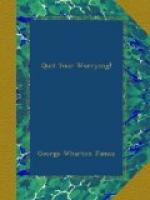When I was about fourteen I took up phonography, or stenography as it is now known. This was an aid in reporting speeches, making notes, etc., but one of its greatest helps was in the matter of analysing the sounds of words thus aiding me in their clear enunciation.
At this time I was also a Sunday school teacher, and at sixteen years of age, a local preacher in the Methodist church. This led to my becoming an active minister of that denomination after I came to the United States, and for seven years I was as active as I knew how to be in the discharge of this work. In my desire to make my preaching effective and helpful I studied unweariedly and took up astronomy, buying a three inch telescope, and soon became elected to Fellowship in the Royal Astronomical Society of England. Then I took up microscopy, buying the fine microscope from Dr. Dallinger, President of the Royal Microscopical Society, with which he had done his great work on bacilli—and which, by-the-way, was later stolen from me—and I was speedily elected a Fellow of that distinguished Society. A little later Joseph Le Conte, the beloved geologist of the California State University, took me under his wing, and set me to work solving problems in geology, and I was elected, in due time, a Fellow of the Geological Society of England, a society honored by the counsels of such men as Tyndall, Murchison, Lyell, and all the great geologists of the English speaking world.
Just before I left the ministry, in 1889, I took up, with a great deal of zeal, the study of the poet Browning. I had already yielded to the charm of Ruskin—whom I personally knew—and Carlyle, but Browning opened up a new world of elevated thought to me, in which I am still a happy dweller. In seeking a new vocation I naturally gravitated towards several lines of thought and study, all of which have influenced




